- Details
- Written by MFA Spokesperson
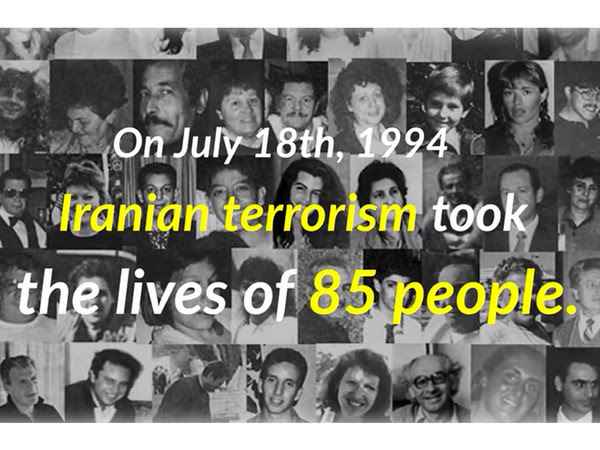
27 years ago, on 18 July 1994 at 9:53 A.M., a huge explosion rocked the city of Buenos Aires - the second murderous attack against Israeli and Jewish targets in Argentina in two years.
Today (July 18, 2021) marks the 27th anniversary of the murderous attack carried out against the Jewish community center AMIA (Asociación Mutual Israelita Argentina) in Buenos Aires, on 18 July 1994. It was the second attack against Jewish and Israeli targets on Argentinian soil – the attack on the Israeli embassy took place only two years previously.
Tragically, 85 people lost their lives in the AMIA attack, and hundreds more were injured.
The sorrow and grief caused by this attack is compounded by the fact that those responsible for this horrifying act, as for the one preceding it, have not yet been brought to justice. After years of investigation, the Argentinian magistrate concluded in 2007 that Iran was behind the attack and responsible for dispatching the murderers. The government of Argentina appealed to Interpol to issue arrest warrants for a number of suspects, and this appeal was approved by the Interpol General Assembly. Israel condemns Iran for its responsibility for terrorist attacks around the world and for funding, instructing, training and arming terror organizations and for threatening to wipe Israel off the face of the earth.
At this difficult hour, the people and government of Israel identify with the bereaved families, with the Jewish community in Argentina and with all the people of Argentina. Concurrently, we would like to congratulate the Jewish community, which has managed to recover from the tragic event, to restore the community and maintain firm ties with the State of Israel. Furthermore, we endorse the Argentinian government's efforts to bring the perpetrators to justice.
- Details
- Written by Spokesperson of the President's Office
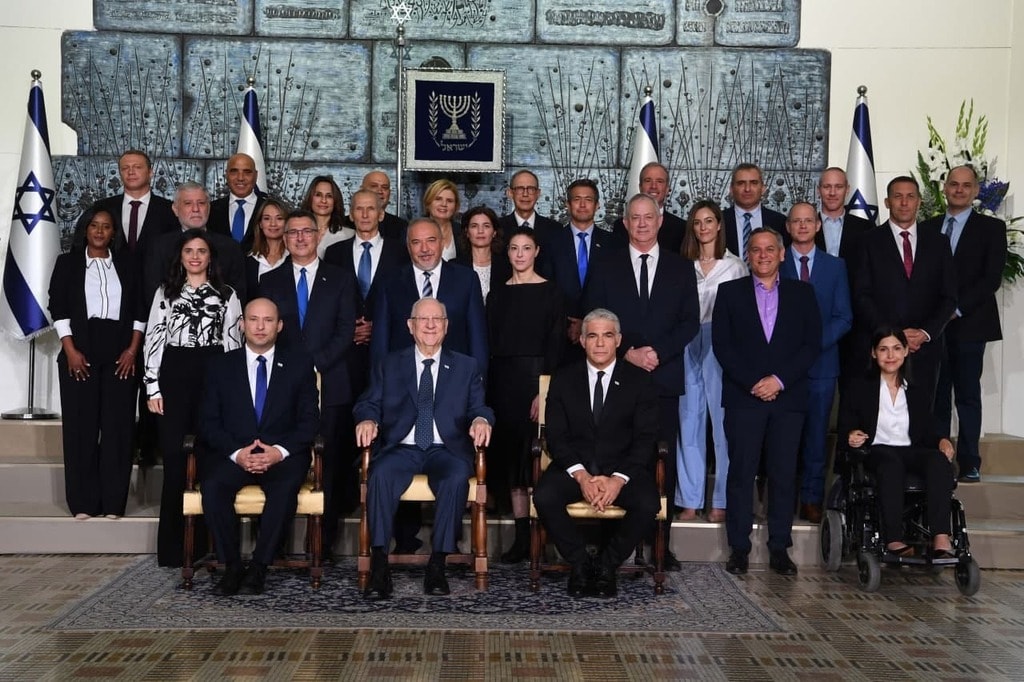
With the formation of Israel’s 36th government, the traditional photograph was taken today, Monday 14 June / 4 Tammuz. The group photograph shows President of Israel Reuven (Ruvi) Rivlin, Prime Minister Naftali Bennett, Alternate Prime Minister and Minister of Foreign Affairs Yair Lapid and the ministers of the new government.
The photograph (credit - Avi Ohayon, GPO) shows:
Front row (R to L): Alternate Prime Minister and Minister of Foreign Affairs Yair Lapid; President of Israel Reuven (Ruvi) Rivlin; Prime Minister Naftali Bennett.
First row (R to L): Minister of National Infrastructure, Energy and Water Karin Elharrar; Minister of Health Nitzan Horowitz; Minister of Defense Benny Gantz; Minister of Transportation and Road Safety Merav MIchaeli; Minister of Finance Avigdor Lieberman; Minister of Justice Gidon Sa’ar; Minister of the Interior Ayelet Shaked.
Second row (R to L): Minister of Religious Services Matan Kahana; Minister of Agriculture and Rural Development and Minister for the Development of the Periphery, the Negev, and the Galilee Oded Forer; Minister of Social Equality Merav Cohen; Minister of Communications Yoaz Hendel; Minister of Environmental Protection Tamar Zandberg; Minister of Internal Security Omer Barlev; Minister of Education Yifat Shasha-Biton; Minister of Labor, Social Affairs and Social Welfare Meir Cohen; Minister of Aliyah and Integratione Pnina Tamano-Shata.
Third row (R to L): Acting Cabinet Secretary Lior Natan; Minister of Culture and Sport Chili Tropper; Minister of Housing and Construction and Minister for Jerusalem Affairs and Heritage Ze’ev Elkin; Minister of Intelligence Elazar Stern; Minister of Diaspora Affairs Nachman Shai; Minister of the Economy Orna Barbivay; Minister for Regional Cooperation Esawi Frej; Minister of Science and Technology Orit Farkash-Hacohen; Minister in the Ministry of Finance Hamed Amar; Minister of Tourism Yoel Razvozov.
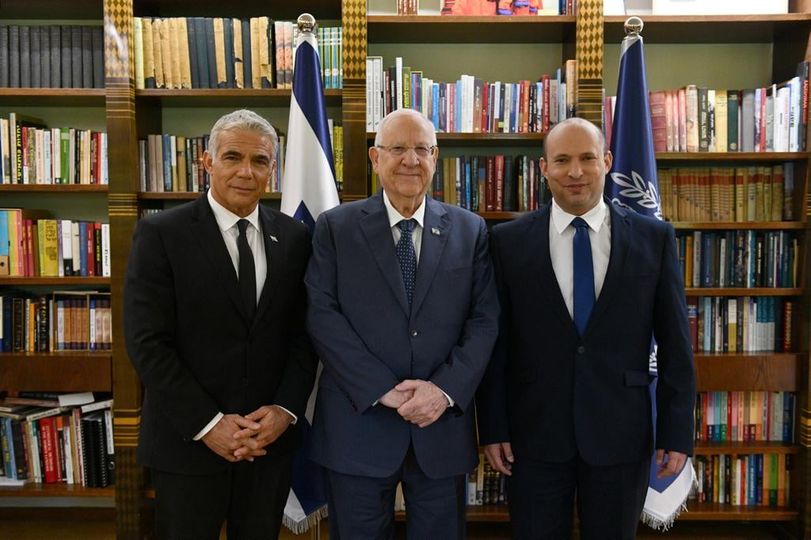
Credit for photo of Pres. Rivlin, Prime Minister Bennett and Alternate Prime Minister / Foreign Minister Lapid: Haim Zach (GPO)
...
- Details
- Written by Silvia G. Golan
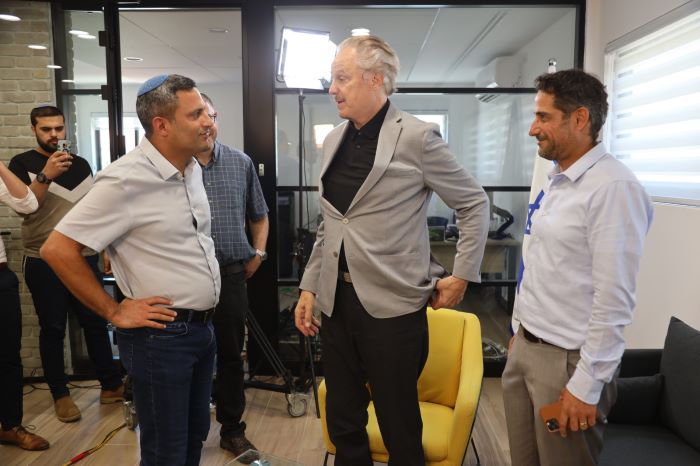
Braving the hailstorm of Gazan rocket fire, Dr. Mike Evans leads delegation of pro-Israel Christian supporters to demonstrate their solidarity with Israel
The delegation led by Dr. Mike Evans, best-selling author, award-winning journalist and American commentator, who founded the Jerusalem Prayer Team in 2002 and Friends of Zion Museum in Jerusalem in 2015 with the goal of highlighting religious tolerance and investing in dialogue between Christian Zionism, the State of Israel and the Jewish people. Evans has also written a number of books and has provided analysis and commentary on Middle East affairs for a variety of media.
Yesterday Tuesday, Evans and his team toured capital Jerusalem, and then proceeded to Ashkelon and Sderot, both of which have been battered throughout the past week by Hamas rocket fire and suffered heavy damage. Early in the morning, the delegation met with a number of families who were evacuated from their homes in Israel’s south and took refuge over the weekend in new apartments recently added to the Holocaust Survivor Guest House, a 10 million NIS project initiated by Evans that includes 7 apartments adapted and accessible to survivors with facilities and features resembling those of a five-star hotel.
One of the families they met and spoke to were the Senders*. Danny Sender, 12, who was evacuated from his home along with his parents and three siblings ages 9, 5 and 2 and offered temporary lodgings in the Guest House after their apartment building was hit by a rocket, shares, “It was terrifying hearing the sirens all the time. We could be anywhere, but we’d have to drop everything and just run. The last time was a blur. I barely remember grabbing Ofer’s hand. He was playing with his train set and didn’t want to let go. But I just yanked him and pulled him inside. Mom slammed the door behind us, and seconds later, we heard the loudest noise I ever imagined. I can still hear it. The building shook like it was going to fall; we were all screaming. And then, it was eerily quiet for a minute.”
“It’s tough. It’s really, really tough,” expresses Danny’s mom, Adi. “Our apartment was damaged, and the kids are traumatized—but thank G-d, we’re all alive and well and safe here. The opportunity to stay in these apartments after all we endured was a lifesaver. It’s so comforting to know that there are people out there—not just in Israel, but also around the world—who care and want to help.”
From Jerusalem, the delegation proceeded to Ashkelon, Israel’s largest city on the Gazan border, which has been pelted by rocket fire and suffered several casualties since the beginning of this mini-war. They met with police officers who patrolled with them around the city. The visit continued with a tour of Sderot and a meeting with residents in the shelters who were deeply moved by the show of American support of Israel, and culminated with a meeting with Sderot’s mayor Mr. Alon Davidi.

In the course of the visit, Evans repeatedly offered his encouragement to Israeli citizens and expressed his disappointment and appall by the skewed media presentation of the true state of affairs. “The media portrays Israel to look like the aggressor and Hamas like the victim, when the opposite is true,” he said. “It’s a media war and a physical war.”
Evans’ relates that his pro-Israel prayer page, which boasts some 78 million followers, was pulled from Facebook after radical Islamists flooded it with extreme anti-Semitic hate speech. Evans had been hosting a daily global prayer event to pray for the peace of Jerusalem. On Thursday, May 13th alone he had one million engagements and 43 million impressions along with a huge number of people posting anti-Israel statements and anti-Semitic pictures and attacking the site, which caused Facebook to close the page.
He explains that Iran is fueling the conflagration, using the Hamas terrorist group as a proxy to fight its war against Israel and the West. “The media throughout the world is buying into the lie, publishing stories that equate Hamas and Israel with moral equivalency, claiming that Hamas is the victim, beaten up by Israeli storm troopers, but it’s a lie.”
Evans shares that he’s planning a Facebook event that will connect world leaders with 78 million followers in the Jerusalem Prayer Team, “But it’s difficult because these devils are trying to win many wars—media war, social network war and a physical war—all with lies.”
Photos & Video credit Perry Mandelbaum
- Details
- Written by Silvia G. Golan
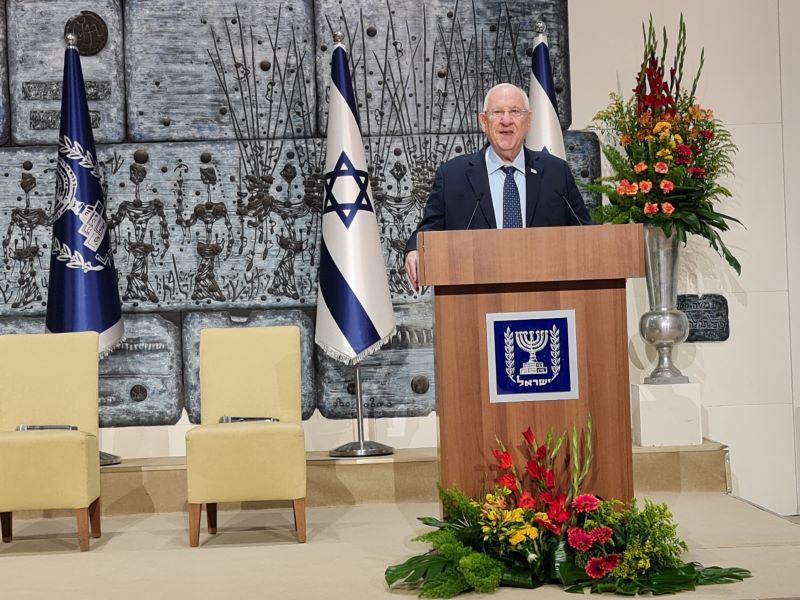
President Rivlin hosted an event marking the centenary of the Manufacturers’ Association of Israel
President Rivlin:
“Buy blue-and-white. There’s nothing better.”
“Over the last year and a half, during the coronavirus pandemic, when countries around the world were lacking in essential products, Israeli industry was part of the national effort. Production was round the clock to ensure that nothing was lacking and that the economy continued to run.”
President of Israel Reuven (Ruvi) Rivlin today, Monday 31 May / 30 Sivan, hosted an event marking the centenary of the Manufacturers’ Association of Israel. President of the Manufacturers’ Association Dr. Ron Tomer, VP Ayelet Nahmias-Verbin, former president Shraga Brosh, industrialists and senior businesspeople participated in the event.
“Today, as we mark the hundredth year of the Manufacturers’ Association, we salute the pioneering industrialists of a land that was undeveloped and you, today’s industrialists who continue in the path of creating and making. You make the wheels of Israel’s economy turn as a developed country whose economy is a source of pride,” said the president at the beginning of his remarks.
“Over the last year and a half, during the coronavirus pandemic, when countries around the world were lacking in essential products, Israeli industry was part of the national effort. Production was round the clock to ensure that nothing was lacking and that the economy continued to run. Israel’s economy is in constant competition with global markets and automation processes which are both an opportunity and a danger. I trust you, Israel’s industrialists, that with your resource, creativity and determination, you will be able to face these challenges by breaking into new markets and by adapting production, all with Israel’s special blend of business smarts and national commitment,” said the president.
He added that in the centenary year of its establishment, the Manufacturers’ Association and its members should set two key targets: “The first is to adopt advanced production technology and to connect traditional industry to the engine of high-tech. The second is to recruit from all parts of Israeli society, particularly the ultra-Orthodox and Arab sectors, which are growing and must be part of the process of developing the economy. They need it and we all need it.”
“We all salute you for your entrepreneurship, your dedication and your application, and congratulate you on continued success and development,” said the president at the end of his remarks. “Buy blue-and-white. There’s nothing better.”
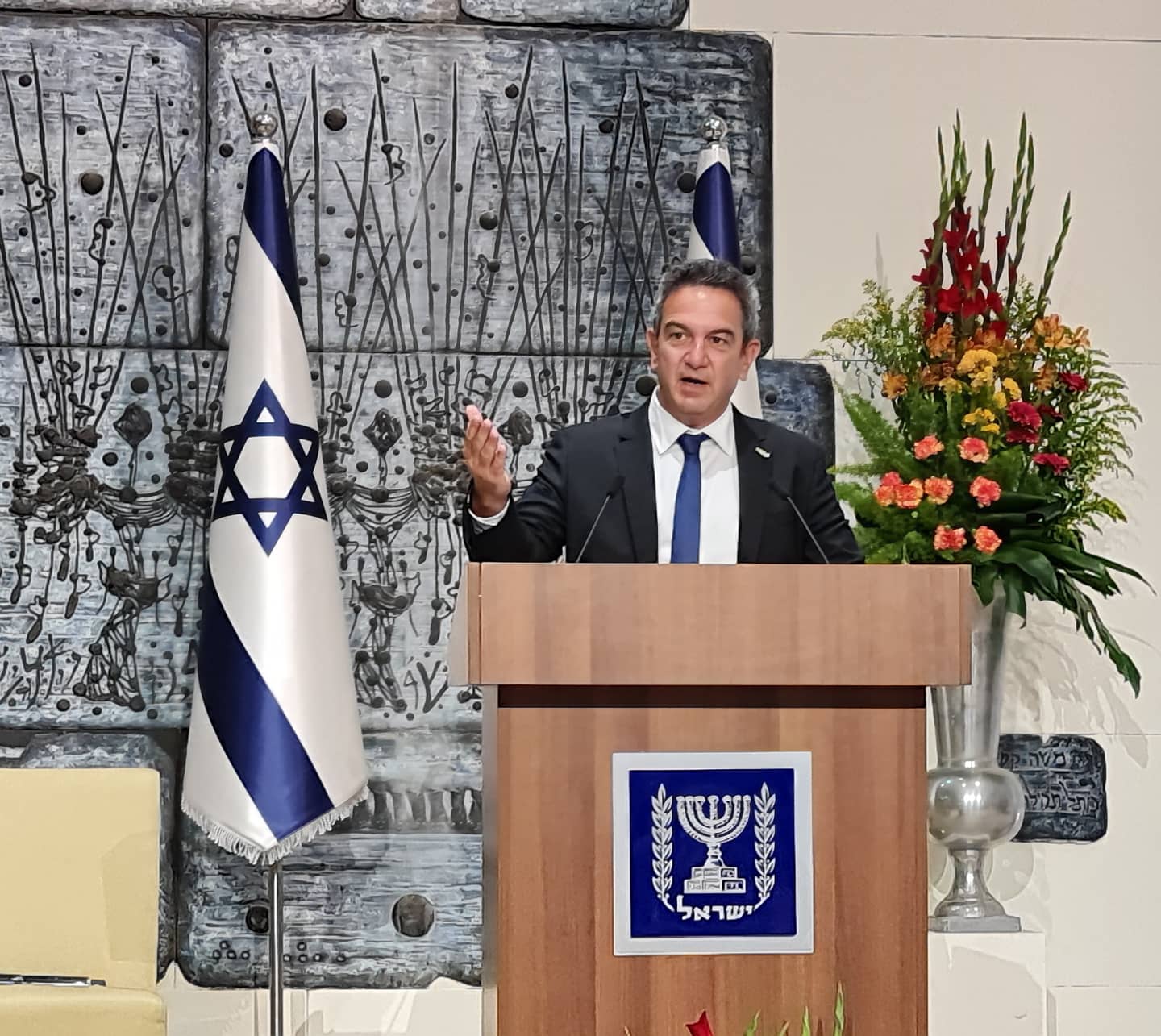
President of the Manufacturers’ Association of Israel, Dr. Ron Tomer, thanked the president and said, “You have been a true partner to Israeli industry. Working together, we have achieved far more with you at our side. Now, as we celebrate one hundred years of the Manufacturers’ Association, we can see that Israeli industry was and will continue to be the true melting pot that bridges the gaps in Israeli society – between men and women, between Jews and Arabs and between center and periphery, offering a better, shared future. So, it is correct to say that industry is Israel’s social and economic ‘iron dome’, and that the foundations of industry are what built the economy and preserved our manufacturing independence, even in times of conflict and crisis. We are partners in creating Israel’s economic and social policy and building its future – creating hundreds of thousands of jobs, and no less important, creating rich and valuable knowledge. Israeli industry is amongst the most advanced in the world today, with cutting-edge computerization, robotics and special system, and together with the high-tech sector we are moving the State of Israel forward. Let me end with the president’s call and to call on you all to buy blue-and-white. By strengthening local industry, we will all enjoy a state that is strong, independent and developed.”
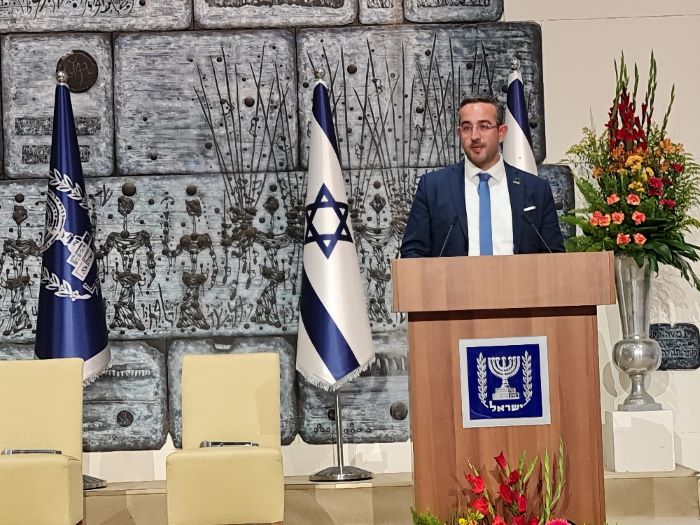
Chair of the committee on Arab society at the Manufacturers’ Association, industrialist Dr. Muhammed Zahalka: “I would like to suggest to the president that there is a fifth tribe, the united tribe. All of us here are part of that tribe, where what unites us is greater than the differences between us, and what we all share is the desire and the vision to lead Israel and to represent her proudly around the world.”
Photo credit Silvia G. Golan
- Details
- Written by Spokesperson of the President's Office
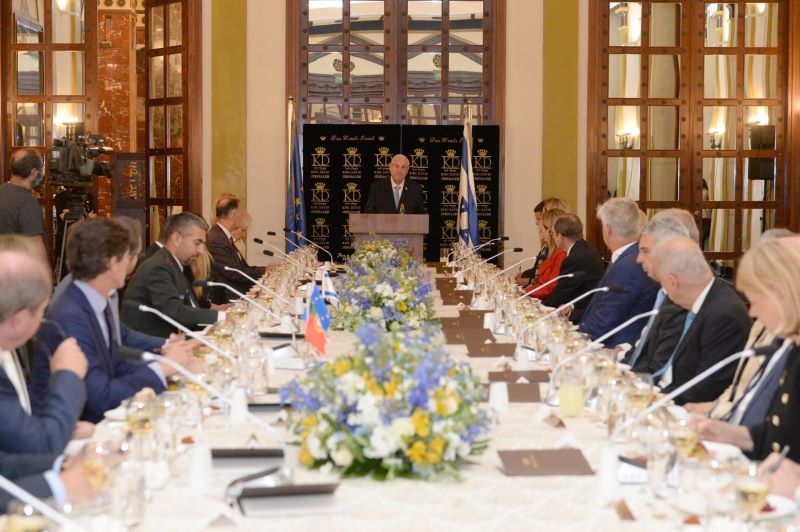
In light of the recent rise in violence, President Rivlin held an emergency briefing for ambassadors of European Union member states in Israel
President Rivlin:
“We will not allow violence and disruption. Palestinian extremists have turned the Temple Mount into a cache for weapons, and a base for attacks. We cannot allow this holy site to be used for violent disorder that threatens both Jewish and Muslim worshippers.”
“The men and women of the Israel Police have acted heroically to restore order and to allow all Jerusalemites to live and pray safely.”
“Yesterday, our capital city, Jerusalem, was attacked. Since then, hundreds of rockets have been fired on our cities and thousands of children have been taken by their parents to the bomb shelters. No country in the world would accept a situation like this. We will never accept this reality. We will protect our citizens by all means necessary.”
President of Israel Reuven (Ruvi) Rivlin today, Tuesday 11 May / 29 Iyyar, held an emergency briefing in light of the recent rise in violence for ambassadors of European Union member states in Israel. The briefing was attended by the EU states’ ambassadors, headed by European Union Ambassador to Israel Emmanuele Giaufret and ambassadors of Germany, Italy, Spain, France and others.
“I wanted to talk with you today about the winds of peace blowing in our region, but you are aware of the provocations, the terrorist attacks and Hamas violence that has turned Ramadan into a nightmare,” said the president to the ambassadors. “Last week, I hosted an Iftar meal at Beit HaNasi for Muslim ambassadors and leaders. They all know that Jerusalem is an open city where people of all religions pray freely. During the month of Ramadan, tens of thousands of Muslims have prayed safely on the Temple Mount, as they do throughout the year. We will always protect and preserve freedom of religion and of worship, but we will not allow violence and disruption that threaten the safety of all Jerusalemites – Jews, Christians and Muslims alike. In recent weeks, we have seen a rise in Palestinian violence against Jews across Jerusalem. Many of these attacks were shared on social media. They have led to outbreaks of violence where Palestinian extremists have turned the Temple Mount into a cache for weapons, and a base for attacks. We cannot allow this holy site to be used for violent disorder that threatens both Jewish and Muslim worshippers. The men and women of the Israel Police have acted heroically to restore order and to allow all Jerusalemites to live and pray safely. As you all know, without any precursor violence, yesterday afternoon our capital city, Jerusalem, was attacked in a barrage of Hamas rockets. Since then, hundreds of rockets have been fired on our cities and thousands of children have been taken by their parents to the bomb shelters. No country in the world would accept a situation like this. We will never accept this reality. We will protect our citizens by all means necessary.”
“As I have said many times before, Arabs and Jews are not doomed to live together. We are destined to do so. The path to peace depends on regional partnerships, developing initiatives that bring benefits to all sides, and building mutual trust and understanding. These are the foundations of peace,” said the president. “In the Middle East as in Europe, there are no short cuts. Peace cannot be based on a piece of paper. Peace cannot develop by attacking Israel in UN bodies or by harming Israel’s right to defend itself through the International Criminal Court. The European Union can play a vital role in promoting Israeli-Palestinian cooperation to the benefit of all sides.”
“The Israeli-Palestinian arena is very important, but there is no reason for EU-Israel relations to be held hostage to the relations between Jerusalem, Ramallah and Gaza. Conditions of this sort damage our future relations, contribute nothing to the Palestinians and do not advance our shared goal of peace. I know that many of you have visited our borders. You have seen for yourselves the threats we face from Iran and its proxies, including Hezbollah. I know that your governments are committed to Israel’s security, and that is why it is crucial to act decisively against terrorism, against Iran’s threats and nuclear ambitions and to put Hezbollah and its various branches beyond the law,” he said in conclusion.
Photo credit: Mark Neyman (GPO)








